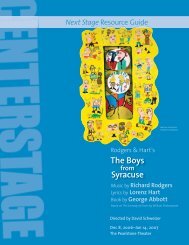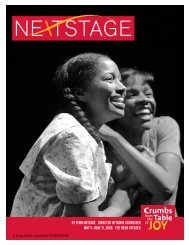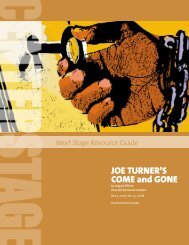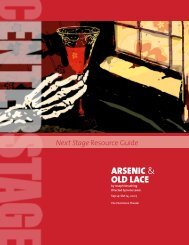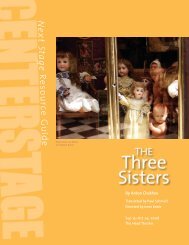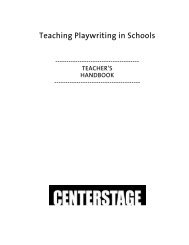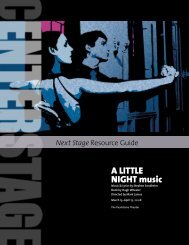The Matchmaker - Center Stage
The Matchmaker - Center Stage
The Matchmaker - Center Stage
You also want an ePaper? Increase the reach of your titles
YUMPU automatically turns print PDFs into web optimized ePapers that Google loves.
lower tip of Manhattan in 1890. An obstacle<br />
to love and freedom, blind to his effect<br />
on others, fond of saying that the world<br />
is getting crazier every minute, Horace is<br />
every fiscal conservative who’s trod the<br />
boards since Euclio in Plautus’ Pot of Gold<br />
circa 200 B.C.<br />
Wilder shrewdly keeps Horace in the middle<br />
of the socioeconomic scale: a merchant is a<br />
more imposing Yankee than a shopkeeper,<br />
but he’s less than a tycoon. Vandergelder<br />
remains in daily physical contact with the<br />
source of his livelihood, and he still keeps<br />
the books. In America, whose limitless<br />
resources and less strictured society made<br />
it the Land of Get Rich Quick practically<br />
from its discovery, Vandergelder got rich<br />
slow. His fortune is the reward of getting<br />
up at five in the morning six days a week<br />
and shutting the store at ten at night. His<br />
is a voice of cautious spleen, and given the<br />
national rate of individual savings in 2008,<br />
he can even make sense (see below.)<br />
But something is different the morning<br />
the play opens. Vandergelder has put aside<br />
“the last dollar of his first half million” and<br />
is looking for a second wife, both to run<br />
the house and, he will grudgingly concede,<br />
to risk a little romantic foolishness and<br />
adventure. He has the notion that, should<br />
he lose his head in the process, he has<br />
enough money to buy it back.<br />
Enter Dolly Gallagher Levi: matchmaker,<br />
Horace’s old friend, and a near-relation to<br />
Wilder’s other brilliant <strong>Stage</strong> Managers in<br />
Pullman Car Hiawatha, <strong>The</strong> Happy Journey<br />
From Trenton to Camden, and Our Town.<br />
She too bears classical lineage. In tragedy,<br />
she’s the nutrix or nurse figure who tends<br />
to give catastrophically bad advice to her<br />
mistress. (“Why not tell your stepson,<br />
Phaedra, that you’re in love with him?” is<br />
WOLF-tRAP’S WISDOM<br />
Unlike current baby-boomers,<br />
Horace Vandergelder clearly won’t<br />
be caught short at retirement time.<br />
A living is made, Mr. Kemper, by selling<br />
something that everybody needs at least<br />
once a year. Yes, sir! And a million is made<br />
by producing something that everybody<br />
needs every day. You artists produce<br />
something that nobody needs at any time.<br />
a shining example.) In commedia dell’arte<br />
and its scripted descendents, she is the wily<br />
Colombina, who abets young lovers and<br />
thwarts their tyrannical fathers. Moreover,<br />
Colombina is often the only one onstage<br />
with functional brain cells.<br />
Putatively engaged in finding a suitable<br />
wife for Horace, Dolly decides to save him<br />
for her own good, and more important,<br />
for his own good. When Wilder began<br />
writing the play in the mid-1930s, the<br />
world was slowly emerging from the Great<br />
Depression. Western societies had been<br />
flirting—and their literatures flirting more<br />
seriously still—with the socialist economic<br />
alternative. Though Dolly is a realist who<br />
knows that two and two make four, life has<br />
endowed her with a suspicious counterwisdom<br />
and the post-marital project of<br />
letting Horace’s wealth flow like “rain water<br />
amongst the dressmakers and restaurants<br />
and cabmen,” with herself as spigot.<br />
Dolly as radical socialist would be the<br />
stuff of satire à la Kaufman and Hart. Her<br />
challenge, to redeem Horace and return<br />
him to the human race, generates a lot of<br />
laughter—money is funny after all—but<br />
Wilder doesn’t soothe his bourgeois<br />
audience with the stage bromides that so<br />
fatigued his spirit and intellect as a young<br />
man. <strong>The</strong> <strong>Matchmaker</strong> does not say that<br />
money won’t buy happiness. Or that you<br />
can live on love. Ambrose and Ermengarde,<br />
and the suddenly smitten Cornelius and<br />
Irene might think so, but Dolly knows<br />
better:<br />
Yes, we’re all fools and we’re all in danger<br />
of destroying the world with our folly.<br />
But the surest way to keep up out of<br />
harm is to give us the four or five human<br />
pleasures that are our right in the<br />
world—and that takes a little money!<br />
Expectations! We merchants don’t do<br />
business with them. I don’t keep accounts<br />
with people who promise somehow to pay<br />
something someday, and I don’t allow my<br />
niece to marry such people.<br />
A man’s not worth a cent until he’s<br />
forty. We just pay ‘em wages to make<br />
mistakes—don’t we, Joe?<br />
While conceding Horace’s point about<br />
human folly, Dolly’s knowledge of the<br />
pleasure principle and the money it takes<br />
to enjoy it is powerful counterweight to<br />
his dour life of Dutch-American industry<br />
and thrift. Her campaign to save him over a<br />
chicken dinner at the Harmonia Gardens—<br />
served with farcical stage business, reverse<br />
psychology, and the telling of some hard<br />
truths—is the emotional linchpin of the<br />
play and a high spot in American comedy.<br />
Can Horace be made to dance again? Can<br />
he move his feet to the tune of something<br />
larger than himself?<br />
Medan agan reads one of the legends<br />
carved on the Temple of Apollo at Delphi.<br />
It means “nothing in excess” and is one<br />
of the touchstones of Greek civilization.<br />
<strong>The</strong> ancient authors decreed that the<br />
function of comedy is to correct, through<br />
painstaking observation, the excesses of<br />
behavior in the average man. Molière’s<br />
Harpagon, Terence’s Euclio, and all the<br />
Pantalones in commedia dell’arte stand<br />
corrected but unchanged at the fall of their<br />
curtains. That Horace Vandergelder loses<br />
his purse and gains a heart is Wilder’s chief<br />
deviation from classical dramaturgy, and<br />
a fitting one for America, de Toqueville’s<br />
bootstraps democracy built on the promise<br />
of personal transformation.<br />
Medan agan. Just enough money. Just<br />
enough change. And just, as Barnaby<br />
says at play’s end, the right amount of<br />
adventure. That Dolly and Horace are able<br />
to come together as human partners is the<br />
longest and happiest adventure in the play,<br />
whether it’s called <strong>The</strong> Merchant of Yonkers<br />
or <strong>The</strong> <strong>Matchmaker</strong>. It merits both titles.<br />
In order to run a house well, a woman<br />
must have the feeling that she owns it.<br />
Marriage is a bribe to make a housekeeper<br />
think she’s a householder.<br />
You pay those girls of yours too much.<br />
You pay them as much as men. Girls like<br />
that enjoy their work. Wages, Mrs. Molloy,<br />
are paid to make people do work they don’t<br />
want to do.<br />
Next <strong>Stage</strong>: <strong>The</strong> <strong>Matchmaker</strong> |



